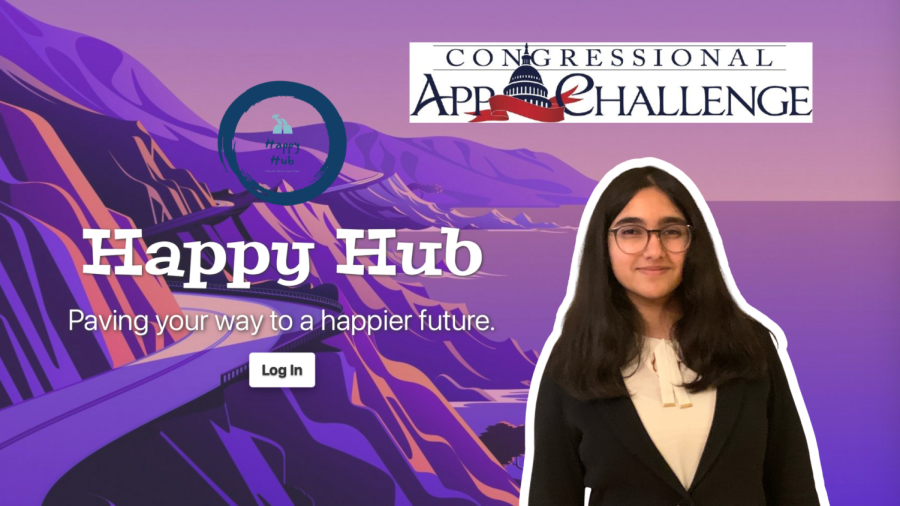Tvisha Choubey (’25) wins 2022 Congressional App Challenge
Tvisha Choubey (’25) was selected as a winner in the 2022 Congressional App Challenge for California’s 15th district, standing out among the competitive group of 9,011 participants across 50 states.
Tvisha Choubey’s app, Happy Hub, is an AI-based app designed to help students build a community to combat mental health issues.
Tvisha Choubey (‘25) and her friends often exchanged stories of finishing homework at 2 am or skipping meals to study for tests. Realizing the damaging impact this had on their mental health, Choubey decided to research the topic, stumbling across surprising statistics of mental disorders. In attempts to help others with this matter, she created Happy Hub, an app that would be a gateway for improving lives around the world.
“My idea for Happy Hub started when I was spending a lot of time in school, and I wasn’t thinking much of my mental or physical health,” said Choubey. “My goal is to reduce the amount of anxiety in teens who don’t have as much time to focus on their health or express themselves.”
Little did she know, Happy Hub would catch Rep. Eric Swalwell’s eye and win her the 2022 Congressional App Challenge in California’s 15th District. Choubey couldn’t believe it when she heard the news. After all, there were 9,011 participants across 50 states—what exactly made her app stand out?
Creating the App
While Happy Hub initially started off as a simple app that predicts moods, Choubey decided to expand her comfort zone and add intricate features to enhance the app’s qualities.
“I used a lot of new technologies like AI and a bunch of different APIs that I had never learned before, so I had to do a lot of research. It wasn’t easy to implement it all and bring it together,” said Choubey.
Choubey incorporated facial recognition in her app, tracking and graphing the user’s daily moods so the user could evaluate their emotional trends. Although Choubey’s initial goal had been accomplished, her work was far from finished. She went even further to account for the user’s thoughts and sympathize with their feelings.
“I wanted to use facial recognition AI because people can sometimes misread themselves or not want to admit when they are unhappy. I kind of feel guilty when I say that I’m feeling super anxious or sad today, so I don’t want anybody to have to feel that guilt if they’re admitting to feeling unhappy. That’s why I added the AI model and journaling,” said Choubey.
While AI facial-recognition and journaling are key features, Choubey’s overall priority is to create a safe place solely for the user’s benefit.
“The best thing [about Happy Hub] is definitely the community,” said Choubey. “They can form clubs or just a place to talk, make new friends. I think that’s very important for mental health — to have people you can talk to.”
The Road Ahead
Although Happy Hub has been a huge success in the Congressional App Challenge, Choubey is continuing to publicize her app through platforms like Heroku. In the future, she hopes to expand the types of services Happy Hub provides.
“In the future I want to make [the AI model] more professional and add another AI model that reads through journals and tries to determine if the user is in danger based on their journal entries. Another thing I want to do is connect users to their therapists so that the therapists can view the users’ graphs and use the data to help their patients better,” said Choubey.
Happy Hub has not only benefited users, but also Choubey herself. While she hopes to major in Computer Science at UC Berkeley after graduating from Amador, the technical knowledge and confidence Choubey gained were valuable lessons for her personal growth.
“I definitely learned a lot while creating Happy Hub. I grew more confident because not only did [the project] push me out of my comfort zone and force me to try new things, but it also showed me that I could win a competition as big as the Congressional App Challenge,” said Choubey.
Your donation will support the student journalists in the AVJournalism program. Your contribution will allow us to purchase equipment and cover our annual website hosting costs.


